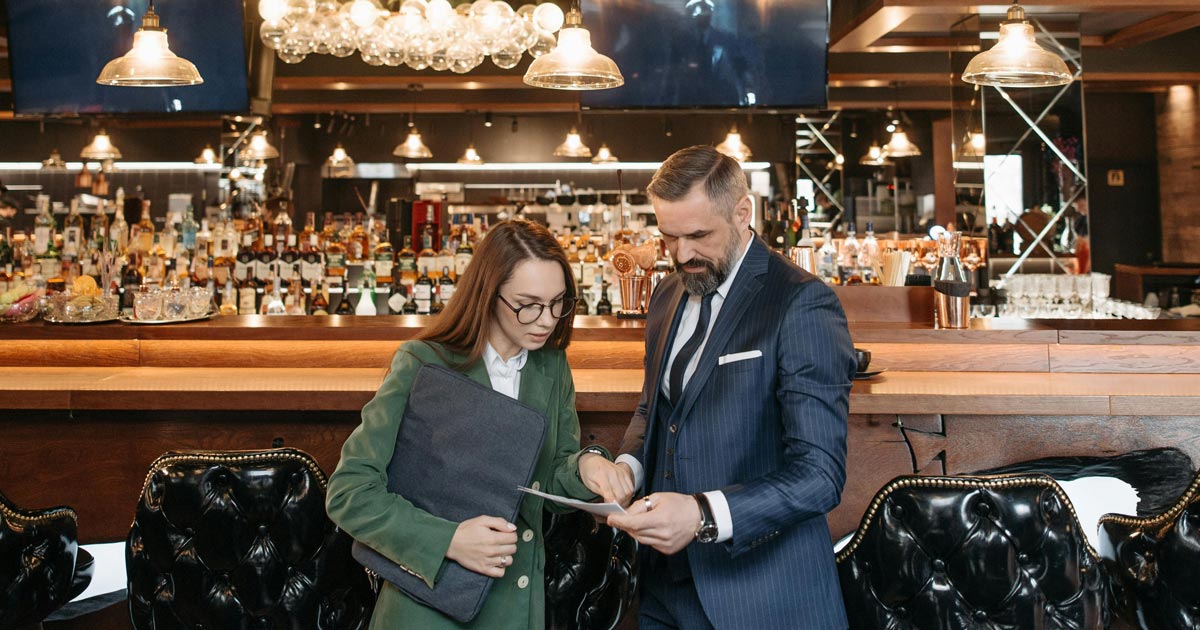I used to think accounting was just compliance.
File the taxes, get the financial statements done, check the box, and move on. That’s what most restaurant owners think, and honestly, that’s exactly what I thought when I was running multiple locations.
My relationship with our accountant was purely transactional—they did their job, I did mine, and that worked alright.
Then I met Gary Shamis and everything changed.
Not only did his team at SS&G save us tens of thousands in taxes we didn’t even know we were overpaying, but they fundamentally transformed how I thought about the financial side of our business.
Recently, I had the opportunity to sit down with Gary, who spent 35 years building SS&G into one of the nation’s largest accounting firms and home to the largest restaurant accounting practice before its merger with BDO, to understand how he discovered an entire industry being underserved—and how he built an empire by serving it better.
Why Gary Shamis Specialized In Restaurant Accounting
Gary Shamis isn’t just another accountant who happened to work with restaurants. He’s the architect of modern restaurant accounting specialization, having built what became the largest restaurant CPA practice in the country.
His journey began in the early 1980s at SS&G with a single restaurant client called Game Keepers Tavern in Chagrin Falls, but it was his perspective on the industry that set him apart from day one.
While other CPAs saw restaurants as risky, cash-heavy businesses to avoid, Gary saw opportunity. More importantly, he saw an industry full of entrepreneurs who deserved better than what they were getting from the accounting world.
The Epiphany That Changed Everything
The moment that transformed Gary’s career—and ultimately the restaurant accounting industry—came in the late 1990s at the Restaurant Finance and Development Conference in Las Vegas. It was, as he puts it, an epiphany.
“Every conference or event I’d ever gone to before was with a bunch of CPAs. But this was different. I went to this conference, and there were a bunch of restaurant owners,” Gary explains. “I went to the sponsor center, and everybody had booths. So I walked around and there was only one CPA firm there, and that was Ernst & Young.”
The revelation was staggering: here was a massive industry conference filled with potential clients, and virtually no accounting firms were paying attention. While CPAs were spending their time at conferences talking to other CPAs, an entire industry was gathering, sharing challenges, and looking for solutions—with almost no professional service providers serving them.
“This epiphany was that if I just spent my time going to this restaurant conference, it would be like a huge opportunity to get new clients.”
But the opportunity was even bigger than Gary initially realized. The accounting industry had written off restaurants, creating negative stereotypes that left an enormous market completely underserved.
The Industry Nobody Wanted
The accounting profession’s bias against restaurants was both pervasive and unfounded. “There was always bad connotations with restaurants and restaurant owners in the CPA industry—small businesses, family owned, high failure rate, lots of cash—and accountants tend to stay away from that,” Gary explains.
This widespread viewpoint created an unprecedented opportunity. “What we learned was that there really was nobody in this huge industry. At that time, it was the second largest populated industry and nobody dominated it.”
The few firms that had attempted restaurant specialization in the past had failed over time, leaving behind only smaller offshoots. The landscape was wide open for someone willing to invest in understanding restaurants and serving them properly.
Marketing to an Underserved Industry
Gary’s approach to building a restaurant practice was methodical. Recognizing his strengths, he focused on what he calls “building the mousetrap”—attracting clients through sophisticated marketing while his partners focused on service delivery.
The strategy was two-pronged: first, attract restaurant clients through targeted marketing; second, build the infrastructure to serve them exceptionally well. Gary’s marketing innovations became legendary in the industry:
Conference Sponsorship Strategy: “We ended up doing things like going to and sponsoring where there were no other CPA firms. Eventually, there were others, but we had a blue ocean at that time.”
Educational Content Marketing: “We had a quarterly newsletter that went out. I can’t tell you how many times I would sit at someone’s desk and who knows where, some other state or city, and they’d have a pile of our newsletters on our desk where they were getting them, keeping them, reading them.”
Infomercial-Style Advertising: “We started advertising in some of the top industry magazines, but they were more like infomercials. We were talking about tax strategy and things like that, not really talking about us.”
The results spoke for themselves: “W just kept adding on and adding on to a point where we were getting double digit growth in that space for 20 years. We took it from a very small business to 20% of our accounting.”
The CFO Bootcamp
One of Gary’s most innovative strategies was creating the CFO Bootcamp, an educational event that became well-known in the restaurant industry.
“That was part of the mousetrap,” Gary explains. “And I don’t even remember exactly how we got there, but that has actually served me well in my Winding River career, because we do boot camps now for partners of CPA firms.”
The bootcamp strategy worked on multiple levels:
Star Power: “The speakers were always profiling our people. We would bring in other speakers, certainly, to help attract the audience like a Melman [Richard Melman from Lettuce Entertain You].”
Peer Validation: “In a perfect scenario, we’d have a bunch of clients that were there, too. So the potential restaurant client for us or new client from us would be talking to an existing client and saying, ‘boy, are these guys really that good?’”
Immediate ROI: “Every time we had one of those events, we did it twice a year, we would cash in new clients in every one of them. And a client could be significant. It could be as much as $100,000 in fees.”
Continuous Learning: “It was a way for us to learn, too. So it was just more than us understanding the tax. It was us as a team also understanding the strategy and how to be successful as a restaurateur.”
How Most CPAs Fail Restaurants
The most revealing aspect of Gary’s success was how consistently generalist CPAs were failing their restaurant clients on basic tax strategy. Gary and his team had a simple but devastatingly effective approach to winning new clients:
“We used to always start out the same way, and that was, show us your tax return. Let us see your tax return for the last couple of years and let us see if your accountant knows what they’re doing.”
The results were predictable and shocking: “I would say 95% of the time, maybe more than that, we would get a tax return and we would find out that their accountant didn’t know what to do, and they were leaving dollars on the table. They were basically just paying too much in taxes because they didn’t know how to best enact the tax laws and tax strategies regarding restaurants.”
This wasn’t about complex, esoteric strategies. These were fundamental restaurant tax issues that any specialist should know. “It really wasn’t that hard and it really wasn’t that magical. And it really just took a little bit of experience and knowledge and know-how to do it.”
The problem was systemic: “There was really no reason for a firm that had 200 clients and one restaurant client to go dig in and something like that. But when you have a firm with 200 clients and 40 of them are restaurant clients, you have a better chance of knowing what the right things are to do.”
[WOTC Case Study Embed]
Why Specialization Matters More Than Ever
The financial stakes of choosing the right CPA have never been higher. Modern restaurant operations involve complex tax scenarios, multi-state compliance issues, and sophisticated growth strategies that generalists simply can’t navigate effectively.
Consider the services specialized restaurant CPAs now routinely provide:
- Cost segregation studies for accelerated depreciation
- Complex S-Corp structuring for liability protection
- Multi-state nexus planning and compliance
- Tip credit optimization and wage hour compliance
- R&D tax credits for menu and process development
- Work Opportunity Tax Credits for targeted hiring
- State and local incentive programs
- Growth financing and entity structuring
Plus, one of the most valuable aspects of working with specialized restaurant CPAs is access to their industry networks. Gary’s team became connectors, introducing clients to the right lawyers, consultants, chefs, and other professionals.
“One of the things we were able to do was really kind of go through our Rolodex and it’s kind of like, what do you need? And why I need a head chef… Or I need an attorney who really understands this… Or we need somebody to do cost segregation study for us.”
This network effect is impossible for generalist firms to replicate: “If you’re dealing with a CPA firm that doesn’t know anybody, then you’re not gonna get any help. And the help you might get might be some local help, but you’re not gonna get any kind of national perspective and people who do nothing but this.”
I experienced this firsthand when I called with an HR question and within a day was connected directly with the chief HR director for Brio Bravo group. That single connection probably saved us $50,000 in legal fees and prevented a potentially serious issue.
The Questions Every Restaurant Should Ask Their CPA
For restaurant owners evaluating their current CPA or considering alternatives, Gary offers practical guidance on identifying true specialists:
Scale and Focus: “I wanna know how many restaurants are you serving and can you tell me how many different restaurant clients, what kind of clients are they, multiple units, things like that I’d wanna know.”
Technical Competence: Look for familiarity with restaurant-specific strategies like S-Corp structuring, cost segregation studies, and complex tip credit calculations.
Geographic Capabilities: “State and local presence. When you have an individual or generic CPA firm, we could have a client and client is usually one entity, one location… Restaurants are usually a lot different. They can have multiple locations, 30, 40 different cities in different states.”
Proactive Planning: Beyond year-end compliance, ask about their approach to forward-looking strategy and growth planning.
Restaurants Deserve Better Accounting
Gary Shamis built one of the country’s largest restaurant accounting practices by recognizing a simple truth: restaurants deserved better than what the accounting industry was providing. Thirty-five years later, that truth remains largely unchanged.
Most restaurant owners still think accounting is just compliance because that’s all they’ve ever experienced. They don’t know that specialized CPAs routinely find tens of thousands in tax savings, provide strategic growth guidance, and connect clients with industry-specific resources that can transform operations.
The opportunity cost of working with generalist CPAs has never been higher. Restaurant operations are more complex, tax law is more sophisticated, and growth strategies require deeper industry knowledge than ever before. Meanwhile, technology has eliminated geographic barriers, making specialized expertise accessible to every restaurant regardless of location.
“Our success is gonna be a win for a lot of people,” Gary concludes about The Restaurant CPAs mission. It’s not just about building another successful business—it’s about finally connecting an underserved industry with the specialized expertise it deserves.
The question isn’t whether you can afford to work with a specialized restaurant CPA. The question is whether you can afford to keep settling for less than your business deserves.
Stop treating accounting as just compliance. Stop accepting that financial expertise is secondary to operations. Stop letting geographic convenience override strategic value. Your restaurant deserves an accounting partner who understands your industry as well as you do—and now, thanks to technology and firms like The Restaurant CPAs, finding that partner is easier than ever.
Ready to Stop Settling for Generic Accounting?
ind out what specialized restaurant CPAs can do for your business. Visit TheRestaurantCPAs.com to connect with accounting professionals who have built their careers serving restaurants like yours, and discover what you might be missing with your current financial advisor.



